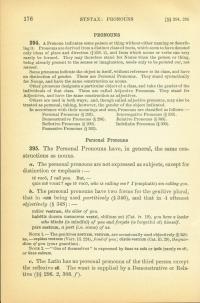295. The personal pronouns have, in general, the same constructions as nouns.
a. The personal pronouns are not expressed as subjects, except for distinction or emphasis.
Tē vocō
I call you.
BUT
Quis mē vocat? Ego tē vocō.
Who is calling me? I am calling you.
b. The personal pronouns have two forms for the genitive plural, that in -um being used partitively (§ 346), and that in -ī oftenest objectively (§ 348).
mâior vestrum
the elder of you
Habētis ducem memorem vestrī, oblītum suī. (Cat. 4.19)
You have a leader who thinks (is mindful) of you and forgets (is forgetful of) himself.
pars nostrum
a part (i.e. some) of us
Note 1— The genitives nostrum, vestrum, are occasionally used objectively (§ 348).
cupidus vestrum (Verr. 3.224)
fond of you
cūstōs vestrum (Cat. 3.29)
the guardian of you (your guardian)
Note 2— One of themselves is expressed by ūnus ex suīs or ipsīs (rarely ex sē), or ūnus suōrum.
c. The Latin has no personal pronouns of the 3rd person except the reflexive sē. This want is supplied by a demonstrative or relative (§ 296.2, § 308.f)

